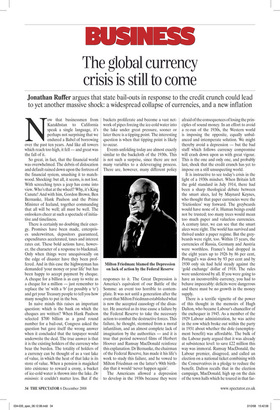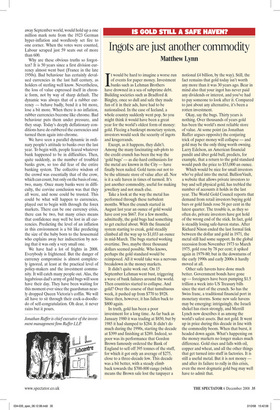The global currency crisis is still to come
Jonathan Ruffer argues that state bail-outs in response to the credit crunch could lead to yet another massive shock: a widespread collapse of currencies, and a new inflation Now that businessmen from Kazakhstan to California speak a single language, it’s perhaps not surprising that we endured a Babel of borrowing over the past ten years. And like all towers which reach too high, it fell — and great was the fall of it.
So great, in fact, that the financial world was overwhelmed. The debris of dislocation and default rained down upon the fortress of the financial system, smashing it to matchwood. Shocking: but all, it seems, is not lost. With screeching tyres a jeep has come into view. Who’s that at the wheel? Why, it’s King Canute! And with him, Gordon Brown, Ben Bernanke, Hank Paulson and the Prime Minister of Iceland, together commanding that all will be well; all must be well. The onlookers cheer at such a spectacle of initiative and timeliness.
There is certainly no doubting their energy. Promises have been made, enterprises underwritten, depositors guaranteed, expenditures accelerated, taxes and interest rates cut. These bold actions have, however, the character of a response to blackmail. Only when things were unequivocally on the edge of disaster have they been proffered. And in this case the highwayman has demanded ‘your money or your life’ but has been happy to accept payment by cheque. A cheque for a billion is as easy to write as a cheque for a million — just remember to replace the ‘m’ with a ‘b’ (or possibly a ‘tr’) and get your Treasury people to tell you how many noughts to put in the box.
In naive minds this raises an important question: which is the bank on which the cheques are written? When Hank Paulson selected $700 billion as a good round number for a bail-out, Congress asked the question but gave itself the wrong answer when it concluded that the taxpayer would underwrite the deal. The true answer is that it is the existing holders of the currency who bear the burden. The totality of holders of a currency can be thought of as a vast lake of value, in which the heat of that lake is its store of value. When a pension is magicked into existence to reward a crony, a bucket of ice-cold water is thrown into the lake. De minimis: it couldn’t matter less. But if the buckets proliferate and become a vast network of pipes forcing the ice-cold water into the lake under great pressure, sooner or later there is a tipping point. The interesting question is when that tipping point is likely to occur.
Events unfolding today are almost exactly similar to the backcloth of the 1930s. This is not such a surprise, since there are not many variables to a deleveraging process. There are, however, many different policy responses to it. The Great Depression is America’s equivalent of our Battle of the Somme: an event too horrible to contemplate. It was not until a generation after the event that Milton Friedman established what is now the accepted causology of the disaster. He asserted as its true cause a failure by the Federal Reserve to take the necessary action to combat the destructive forces. This failure, he thought, stemmed from a moral infantilism, and an almost complete lack of imagination by the authorities — and it is true that period newsreel films of Herbert Hoover and Ramsay MacDonald reinforce this explanation. Dr Bernanke, the chairman of the Federal Reserve, has made it his life’s work to study this failure, and he vowed to Milton Friedman on the latter’s 90th birthday that it would ‘never happen again’.
The Americans allowed a depression to develop in the 1930s because they were afraid of the consequences of losing the principles of sound money. In an effort to avoid a re-run of the 1930s, the Western world is imposing the opposite, equally unbalanced and intemperate solution. We might thereby avoid a depression — but the bad stuff which follows currency compromise will crash down upon us with great vigour. This is the one and only one, and probably last, shock that the credit crunch has yet to impose on a still unsuspecting world.
It is instructive to see today’s crisis in the light of a 1930s mindset. When Britain left the gold standard in July 1914, there had been a sharp theological debate between the smart alecs, led by Maynard Keynes, who thought that paper currencies were the ‘frictionless’ way forward. The greybeards would have none of it. Human beings could not be trusted; too many trees would mean too much paper and valueless currencies. A century later, we can see that the smart alecs were right. The world has survived and thrived under a paper regime. But the greybeards were right, too. Within 15 years, the currencies of Russia, Germany and Austria were worthless. France’s had dropped in the eight years up to 1926 by 86 per cent, Portugal’s was down by 93 per cent and by 1930 only six had held steady against the ‘gold exchange’ dollar of 1918. The rules were understood by all. If you were going to have an inconvertible currency, you had to behave impeccably: deficits were dangerous and there must be no growth in the money supply.
There is a terrific vignette of the power of this thought in the memoirs of Hugh Dalton, who became Labour’s chancellor of the exchequer in 1945. As a member of the 1929 Labour administration, he was active in the row which broke out within the party in 1931 about whether the dole (unemployment benefit) was affordable. The bulk of the Labour party argued that it was already at subsistence level: to save £22 million this way was immoral. Ramsay MacDonald, the Labour premier, disagreed, and called an election on a national ticket combining with the Conservatives in a pledge to reduce the benefit. Dalton recalls that in the election campaign, MacDonald, high up on the dais of the town halls which he toured in that far away September world, would hold up a one million mark note from the 1923 German hyper-inflation and wordlessly set fire to one corner. When the votes were counted, Labour scraped just 59 seats out of more than 600.
Why are these obvious truths so forgotten? It is 50 years since a first division currency almost went bust (France in the late 1950s). Bad behaviour has certainly devalued currencies in the last half century, as holders of sterling well know. Nevertheless, the loss of value expressed itself in chronic form, not by way of sharp default. The dynamic was always that of a rubber currency — behave badly, bend it a bit more, lose a bit more. When there is no inflation, rubber currencies become like chrome. Bad behaviour puts them under pressure, and they snap. Today’s deeply deflationary conditions have de-rubbered the currencies and turned them again into chrome.
We have seen a parallel dynamic in ordinary people’s attitude to banks over the last year. To begin with, people feared whatever bank happened to be in difficulties. Then, quite suddenly, as the number of troubled banks grew, so too did fear of the entire banking system. The collective wisdom of the crowd was essentially that of the crow, which can count, but only on the basis of one, two, many. Once many banks were in difficulty, the corvine conclusion was that they all were, and none could be trusted. This could be what will happen to currencies, played out to begin with through the forex markets. There can be one currency crisis, there can be two, but many crises means that confidence may well be lost in all currencies. Predicting the level of an inflation in this environment is a bit like predicting the size of the baby born to the housemaid who explains away her indiscretion by noting that it was only a very small one.
We have had a lot of frights in 2008. Everybody is frightened. But the danger of currency compromise is almost completely ignored, at least at the practical level of policy-makers and the investment community. It will catch many people out. Alas, the lugubrious dad’s army of gold bugs will soon have their day. They have been waiting for this moment ever since the guardsman nearly dropped Queen Victoria’s coffin. We will all have to sit through their cock-a-doodledo of self-congratulation. Oh dear, it never rains but it pours.
Jonathan Ruffer is chief executive of the investment management firm Ruffer LLP.



















































































 Previous page
Previous page